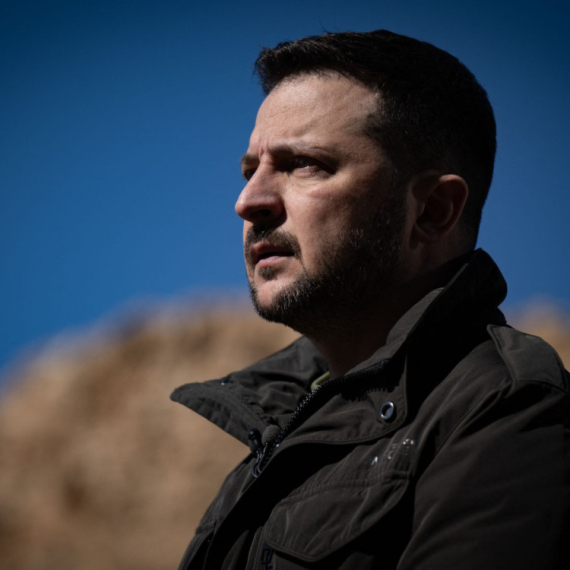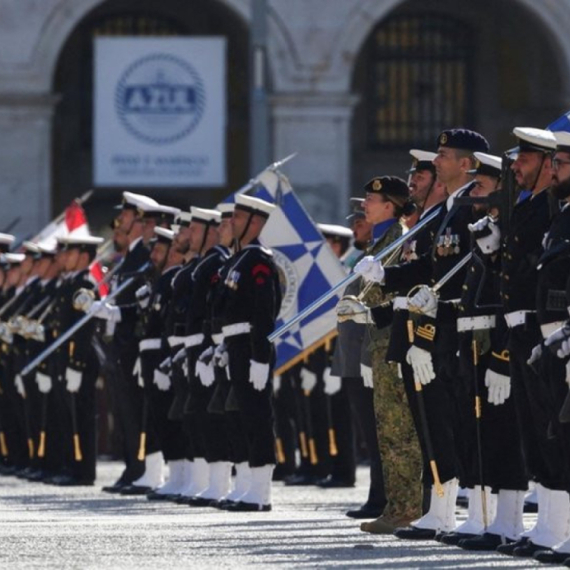"EU partners were consulted on resolution"
Serbian President Boris Tadić said on Friday that the draft resolution on Kosovo that Belgrade presented to the UN General Assembly is a constructive document.
Friday, 30.07.2010.
16:50

Serbian President Boris Tadic said on Friday that the draft resolution on Kosovo that Belgrade presented to the UN General Assembly is a constructive document. Speaking on Mt. Tara in western Serbia, where he was visiting a summer camp, Tadic told reporters that the draft was consistent with the interests of the EU. "EU partners were consulted on resolution" He said the European Commission and a large number of EU countries were happy with the text. Tadic added that while drafting the resolution, Serbia consulted European partners regarding the content and tone of the resolution, and that the text satisfied the European Commission and the vast majority of EU member states. "Serbia has all the time been in contact with its European friends, since this country should be a predictable partner. Serbia should build a genuine partnership with the EU without any surprises," Tadic said, stressing that the resolution was written by Serbia alone, which means that there was no joint work on the document. According to him, except for a few statements of a number of ambassadors in Belgrade, no European government official has protested against the resolution that was submitted to the UN General Assembly. "Serbia has no intention, or interest, to get into conflict with the international community, but, like any other country, it has lines it cannot cross," Tadic said, expressing his conviction that Serbia's last line is ultimately in keeping with international community interests too. "Getting the resolution adopted by the UN General Assembly will not be an easy job, and if Serbia succeeds, it will be a great success," he said. "Through its approach, Serbia is not fanning the flames, but contributing to a peaceful and sober solution through dialogue, in which each side will get something and lose something. Serbia is, obviously, aware of the fact that perhaps two million Kosovo Albanians do not wish to accept Serbia's constitutional order," he said. "However, the world must be aware of the fact that Kosovo Serbs do not wish to accept the sovereignty of the so-called state of Kosovo," noted Tadic. "It is within that framework that a solution should be sought that would secure peace and development. In drafting the resolution, Serbia has honored the procedure agreed with the European Commission, but has hurried to submit it to the UN GA in order to avoid being overtaken by a resolution of Kosovo Albanians," the president was quoted as saying. "Information was obtained that Kosovo Albanians intend to submit their own resolution to the UN GA and Serbia could not take the risk to be second, because if the first resolution is adopted, the second one does not come up for the vote," Tadic said. "Serbia could not allow the possibility of its resolution not being discussed at all," he concluded. FM Vuk Jeremic, Boris Tadic (FoNet, file) Ganic ruling "offensive" Boris Tadic stated on Friday that he was insulted by the British court's explanation regarding its refusal to extradite a former member of the wartime Bosnia-Herzegovina Presidency Ejup Ganic to Serbia. Westminster Magistrates' Court District Judge Timothy Workman said that there is evidence that the trial of Ganic in Serbia would be politically motivated, and added he did not receive any new convincing or reliable proof for his extradition. "The insinuation that somebody could be tried based on the politics and not law in Serbia is completely incomprehensible to me and I see it both as a personal offense and offense to my country," Tadic told journalists at the Tara mountain, western Serbia. Tadic noted that Serbia passes draconian prison sentences to its citizens who have committed war crimes without discriminating them on ethnic or religious grounds. "I would be satisfied if the ambassadors of the countries which are sending these messages would explain to their judicial institutions that Serbia is a country that observes the EU legal system and that it does not discriminate people on the grounds of their ethnicity or religion," Tadic concluded. Ganic, a former Muslim member of Bosnia's presidency, is wanted in Serbia on war crimes charges related to the May 1992 massacre in Sarajevo of a convoy of retreating Yugoslav People's Army (JNA) soldiers.
"EU partners were consulted on resolution"
He said the European Commission and a large number of EU countries were happy with the text.Tadić added that while drafting the resolution, Serbia consulted European partners regarding the content and tone of the resolution, and that the text satisfied the European Commission and the vast majority of EU member states.
"Serbia has all the time been in contact with its European friends, since this country should be a predictable partner. Serbia should build a genuine partnership with the EU without any surprises," Tadić said, stressing that the resolution was written by Serbia alone, which means that there was no joint work on the document.
According to him, except for a few statements of a number of ambassadors in Belgrade, no European government official has protested against the resolution that was submitted to the UN General Assembly.
"Serbia has no intention, or interest, to get into conflict with the international community, but, like any other country, it has lines it cannot cross," Tadić said, expressing his conviction that Serbia's last line is ultimately in keeping with international community interests too.
"Getting the resolution adopted by the UN General Assembly will not be an easy job, and if Serbia succeeds, it will be a great success," he said.
"Through its approach, Serbia is not fanning the flames, but contributing to a peaceful and sober solution through dialogue, in which each side will get something and lose something. Serbia is, obviously, aware of the fact that perhaps two million Kosovo Albanians do not wish to accept Serbia's constitutional order," he said.
"However, the world must be aware of the fact that Kosovo Serbs do not wish to accept the sovereignty of the so-called state of Kosovo," noted Tadić.
"It is within that framework that a solution should be sought that would secure peace and development. In drafting the resolution, Serbia has honored the procedure agreed with the European Commission, but has hurried to submit it to the UN GA in order to avoid being overtaken by a resolution of Kosovo Albanians," the president was quoted as saying.
"Information was obtained that Kosovo Albanians intend to submit their own resolution to the UN GA and Serbia could not take the risk to be second, because if the first resolution is adopted, the second one does not come up for the vote," Tadić said.
"Serbia could not allow the possibility of its resolution not being discussed at all," he concluded.
Ganić ruling "offensive"
Boris Tadić stated on Friday that he was insulted by the British court's explanation regarding its refusal to extradite a former member of the wartime Bosnia-Herzegovina Presidency Ejup Ganić to Serbia.Westminster Magistrates' Court District Judge Timothy Workman said that there is evidence that the trial of Ganić in Serbia would be politically motivated, and added he did not receive any new convincing or reliable proof for his extradition.
"The insinuation that somebody could be tried based on the politics and not law in Serbia is completely incomprehensible to me and I see it both as a personal offense and offense to my country," Tadić told journalists at the Tara mountain, western Serbia.
Tadić noted that Serbia passes draconian prison sentences to its citizens who have committed war crimes without discriminating them on ethnic or religious grounds.
"I would be satisfied if the ambassadors of the countries which are sending these messages would explain to their judicial institutions that Serbia is a country that observes the EU legal system and that it does not discriminate people on the grounds of their ethnicity or religion," Tadić concluded.
Ganić, a former Muslim member of Bosnia's presidency, is wanted in Serbia on war crimes charges related to the May 1992 massacre in Sarajevo of a convoy of retreating Yugoslav People's Army (JNA) soldiers.



























































Komentari 14
Pogledaj komentare